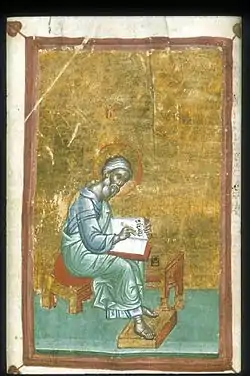Minuscule 45
Minuscule 45 (in the Gregory-Aland numbering), ε 442 (Von Soden),[1] is a Greek minuscule manuscript of the New Testament, on parchment leaves. Palaeographically it has been assigned to the 13th century. It has complex contents and full marginalia.
| New Testament manuscript | |
 Portrait of Matthew Evangelist on folio 6 verso | |
| Text | Gospels † |
|---|---|
| Date | 13th century |
| Script | Greek |
| Found | 1760-1770, Athos |
| Now at | Bodleian Library |
| Size | 18.5 cm by 13.5 cm |
| Type | Byzantine text-type |
| Category | V |
| Note | marginalia |
Description
The codex contains the text of the four Gospels on 398 leaves (size 18.5 cm by 13.5 cm) with only one lacunae (Mark 2:5-15). The text is written in one column per page, 19-21 lines per page in very neat minuscule letters.[2][3] The initial letters in gold or red.[4]
The text is divided according to the κεφαλαια (chapters), whose numbers are given at the margin, with occasional τιτλοι (titles) at the top of the pages. There is also another division according to the smaller Ammonian Sections (in Matthew 355, Mark 233 – 16:8; Luke 342, John 230 sections), with references to the Eusebian Canons.[4]
The codex contains the Eusebian Canon tables at the beginning, tables of the κεφαλαια (tables of contents) precede each Gospel, lectionary markings at the margin (for liturgical use), subscriptions at the end of each Gospel, numbers of στιχοι in the Gospel of Luke, and pictures.[5][4]
Text
The Greek text of the codex is a representative of the Byzantine text-type.[6] Hermann von Soden included it to the textual family Kx.[7] Kurt and Barbara Aland placed it in Category V.[8] According to the Claremont Profile Method it represents the textual family Kx in Luke 1 and Luke 20. In Luke 10 no profile was made.[7]
History
The manuscript was dated by Gregory to the 14th century.[4] Currently it has been assigned by the INTF to the 13th century.[2][3]
The codex was brought from Athos to England by César de Missy (1703-1775), French chaplain of George III, King of England, who spent his life in collecting materials for an edition of the New Testament. It was examined by Mill (Bodl. 1), Griesbach, and Wetstein in 1746.[5]
It was added to the list of the New Testament manuscripts by Wettstein. C. R. Gregory saw it in 1883.[4]
It is currently housed in at the Bodleian Library (Barocci 31), at Oxford.[2][3]
References
- Gregory, Caspar René (1908). Die griechischen Handschriften des Neuen Testament. Leipzig: J. C. Hinrichs'sche Buchhandlung. p. 49.
- K. Aland, M. Welte, B. Köster, K. Junack, "Kurzgefasste Liste der griechischen Handschriften des Neues Testaments", Walter de Gruyter, Berlin, New York 1994, p. 49.
- "Liste Handschriften". Münster: Institute for New Testament Textual Research. Retrieved 19 October 2014.
- Gregory, Caspar René (1900). Textkritik des Neuen Testamentes. Vol. 1. Leipzig: J.C. Hinrichs'sche Buchhandlung. p. 139.
- Scrivener, Frederick Henry Ambrose; Edward Miller (1894). A Plain Introduction to the Criticism of the New Testament. Vol. 1 (4 ed.). London: George Bell & Sons. p. 197.
- C.v. Tischendorf (1859). Novum Testamentum Graece. Editio Septima. Lipsiae. p. CXCIX.
{{cite book}}: CS1 maint: location missing publisher (link) - Wisse, Frederik (1982). The Profile Method for the Classification and Evaluation of Manuscript Evidence, as Applied to the Continuous Greek Text of the Gospel of Luke. Grand Rapids: William B. Eerdmans Publishing Company. p. 53. ISBN 0-8028-1918-4.
- Aland, Kurt; Aland, Barbara (1995). The Text of the New Testament: An Introduction to the Critical Editions and to the Theory and Practice of Modern Textual Criticism. Erroll F. Rhodes (trans.). Grand Rapids: William B. Eerdmans Publishing Company. p. 138. ISBN 978-0-8028-4098-1.
Further reading
- Giancarlo Prato, Scritture librarie arcaizzanti della prima età dei Paleologi e loro modelli [first published 1979], reprinted in his collected articles, Studi di paleografia greca, Spoleto 1994, pp. 73–114, Tavv. 1-24, at pp. 78, 85, 109 n. 87
External links
- MS. Barocci 31 Images available on Digital Bodleian
- MS. Barocci 31 In the Bodleian Libraries Catalogue of Medieval Manuscripts